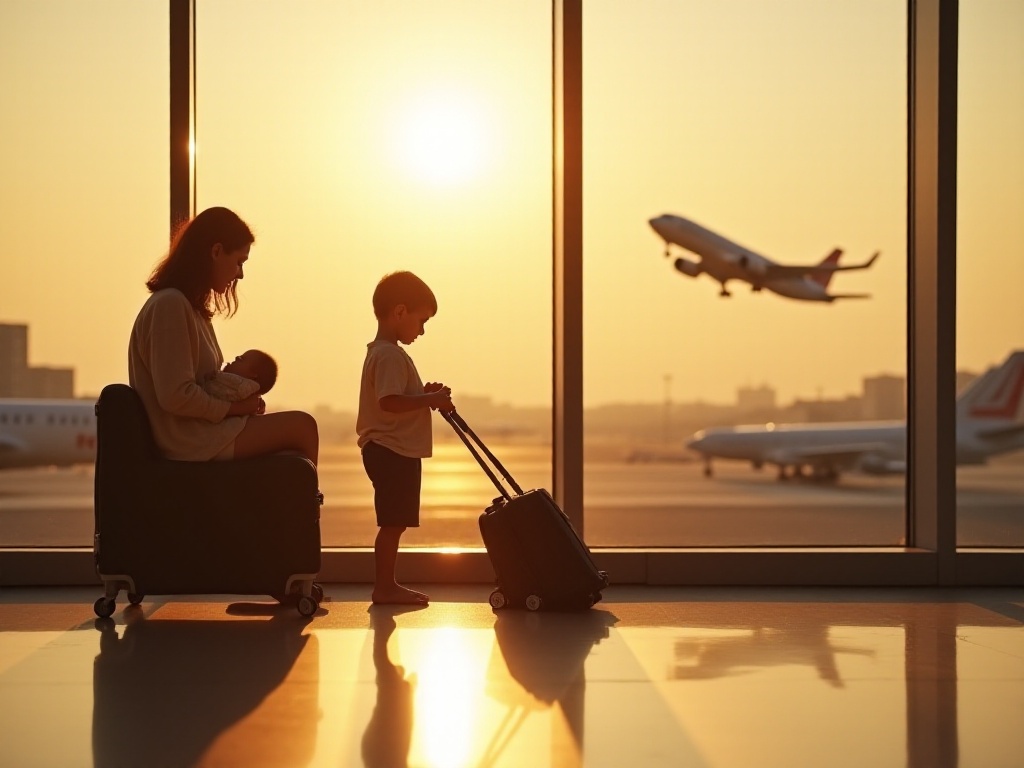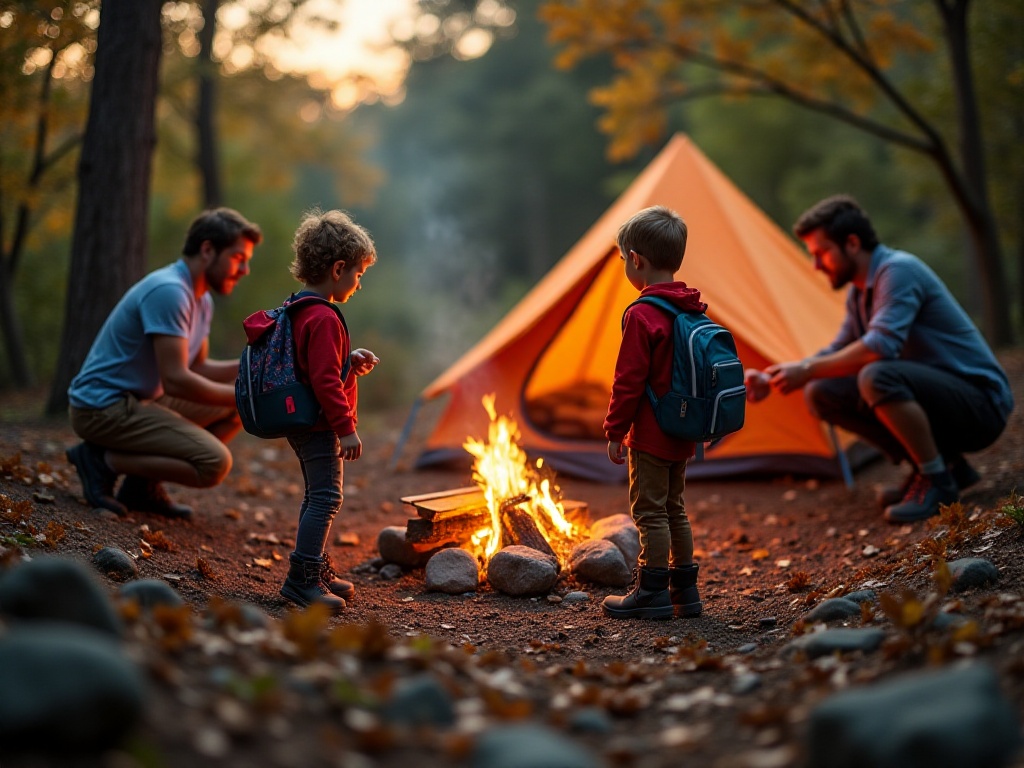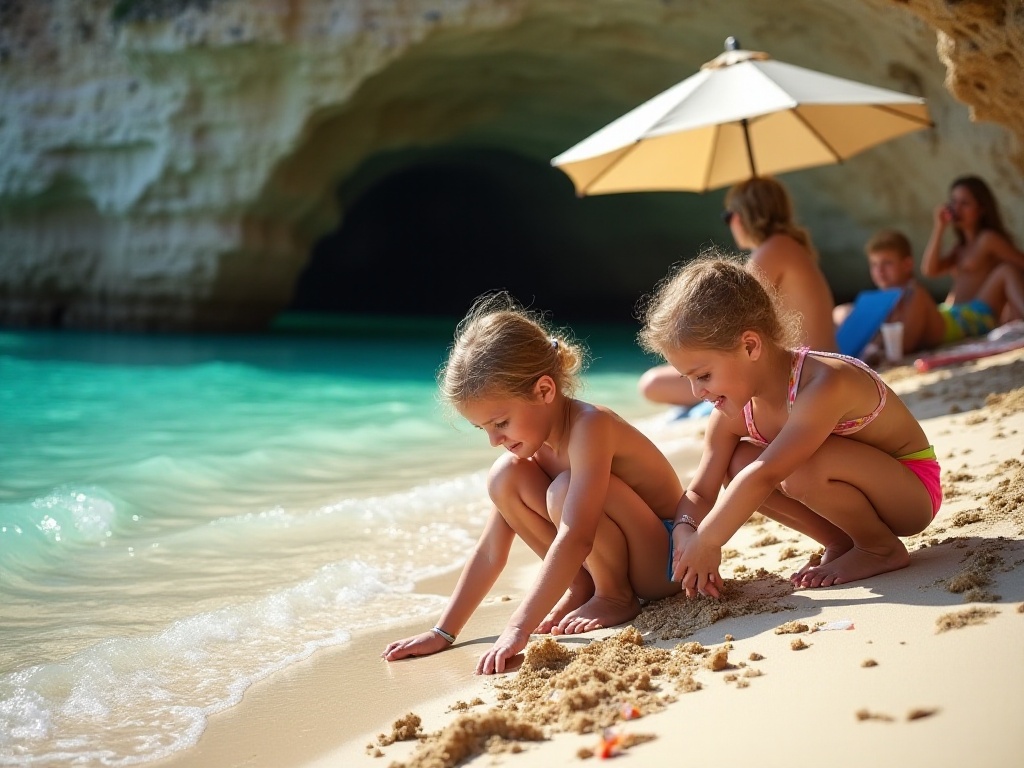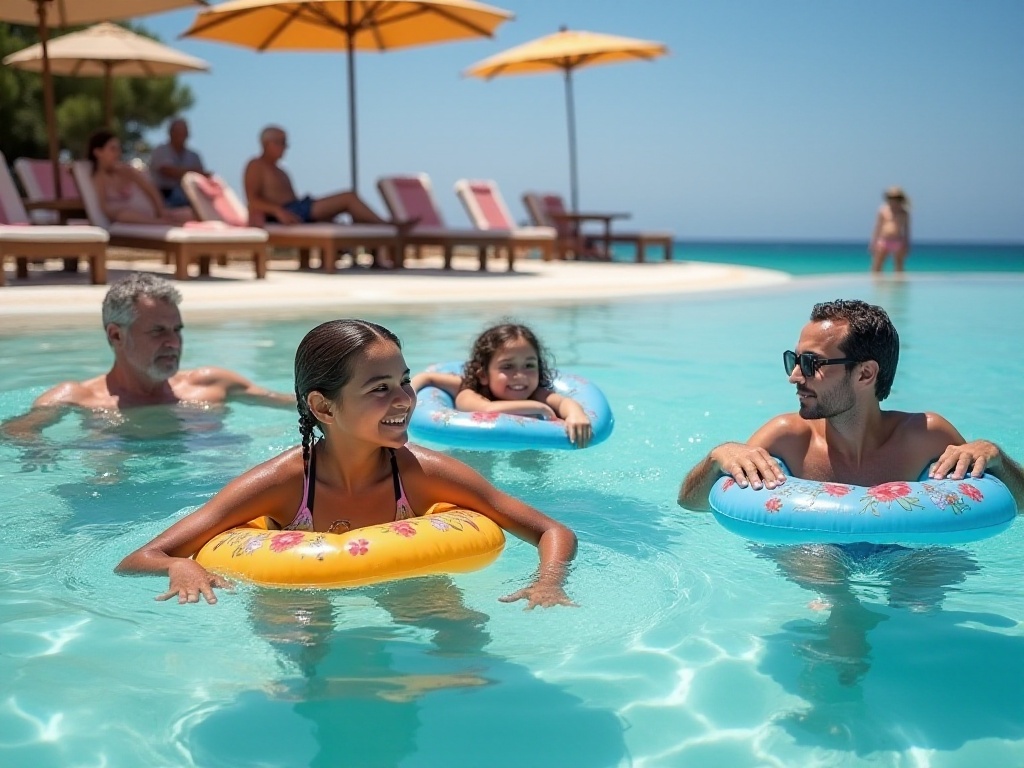Background
This past summer, I took another spontaneous trip with my daughter. This marks my 8th year of traveling with kids! Honestly, the journey from being completely overwhelmed at the beginning to now being able to handle various unexpected situations with ease has been quite remarkable. Looking back at how flustered I was during our first trip makes me both laugh and feel nostalgic. Fortunately, years of experience have made me more proficient, and today I'm sharing these practical tips to help those of you who want to travel with your children!
For Infants and Toddlers
Traveling with infants and toddlers can be both delightful and challenging. I remember being completely overwhelmed during my first trip with my three-month-old son. Back then, just preparing formula and diapers would make me anxious for days, worried about not bringing enough. Looking back now, I realize that with proper preparation, traveling with infants isn't as daunting as it seems.
Health issues are absolutely paramount! I still remember the doctor's advice during my son's first checkup. He said, "When traveling with such a young child, you must first ensure their health is in good condition." This is especially true for international travel, where pre-trip medical checkups are essential. Once, before our trip to England, the doctor specifically reminded us to supplement vitamin D for the baby due to London's frequent rain and limited sunlight. These details are crucial - I wouldn't have thought of this without the doctor's reminder.
Medical supplies have become my most carefully prepared items. After years of experience, my medical kit now includes: fever reducers (both liquid and suppository forms), cold medicine, anti-diarrheal medication, digestive medicine, band-aids, antiseptic spray, iodine, cotton swabs, and a thermometer. Looking back, all these items have proven useful at some point.
Once in Thailand, my son suddenly developed a fever of 39°C (102.2°F) in the middle of the night. If I hadn't brought fever medication, I would have panicked. Although Thailand has good medical facilities, finding a hospital at night and dealing with language barriers would have been overwhelming. So my principle now is: better to have it and not need it than need it and not have it.
When it comes to safety protection, this has really been a major concern. Many new parents might think I'm being overly cautious, but some experiences have taught me that you can never be too careful with safety measures. One year in Japan, we discovered at the hotel that their electrical outlets were completely different from those at home. If I hadn't brought outlet covers, I wouldn't have been able to sleep seeing all those exposed sockets around the room.
The choice of stroller is another important consideration. Over the years, I've gone through several strollers and found that lightweight, easily foldable ones are the most practical. Once in Sanya, we brought a particularly heavy stroller and were exhausted just getting through the airport, let alone the days of sightseeing that followed. Since then, I've always chosen lightweight strollers that can be folded with one hand and weigh around 5 kilograms.
There's also a technique to preparing formula and diapers. I now divide formula into several small sealed containers, each containing a day's worth. This ensures hygiene and prevents losing all the formula if one container spills. For diapers, I usually pack 33% extra because children might have diarrhea due to changes in environment, which increases diaper usage.
Infant clothing requires special attention. I now prepare clothes in three thicknesses: light, medium, and heavy. Babies are particularly sensitive to temperature, and many places have significant indoor-outdoor temperature differences. I learned this lesson in Sanya - thinking it would be hot in Hainan, but the hotel's air conditioning was so strong that my son nearly caught a cold at night.
Toy selection is also important. I usually bring one or two of the baby's favorite toys, plus one or two new ones for backup. However, avoid toys that make noise as they can disturb others on planes or in hotels.
For Children
When children reach the 6-12 age range, traveling with them becomes particularly interesting. Kids this age are especially curious about new things and love to explore, but they can also get bored easily. This requires careful preparation.
First, let's talk about packing. After years of experience, I've developed a very practical packing system. I pack clothes in different compression bags according to outfits, each labeled with the date of use. For example, a bag labeled "Day 1: Disneyland" contains all the clothes needed for that day. This eliminates the need to rummage through luggage every morning.
Not just clothes, I organize other items by category too. Toiletries in one bag, medicines in another, and electronic devices and chargers in another. Each bag is marked with a different color for easy identification. This organization method not only keeps the suitcase neat but also makes finding things much easier.
Regarding luggage, here's an important tip: children this age can have their own small suitcase. Letting them pack their own toys and daily items helps develop independence and gives them a sense of involvement in the trip. My son has had his own 18-inch suitcase since he was 7, and now he's very organized with packing.
Entertainment during travel is crucial. Even the most active children can get bored during long trips. I always prepare some new items to bring out when children become restless. Last year when we went to America, we had a 14-hour flight. I specially bought a new coloring book and a box of unused crayons, which I brought out when my son started getting fidgety at the 8-hour mark - it kept him quiet for several hours.
Besides toys, a tablet is essential. But it's important to control usage time. I usually download some meaningful documentaries or educational games in advance, which helps pass time without becoming too addictive.
Meals require special attention too. Children this age have their own food preferences, but their preferred foods might not always be available while traveling. So I always bring some of their favorite snacks just in case. However, moderation is key, as trying different foods is part of the travel experience.
I have a small trick for itinerary planning: make sure each day includes one activity that the child is particularly looking forward to. This way, even if other activities might not be as interesting, having something to look forward to keeps their spirits up. For example, when we went to Japan, we arranged one theme park or special activity each day, and spent the rest of the time visiting historical sites or shopping.
Accommodation choice is also crucial. Children this age have abundant energy, so I now prioritize hotels with swimming pools or children's playgrounds. This way, when we return to the hotel in the evening, children can play for a while and release their remaining energy. Once in Singapore, our hotel had an excellent kids' club with various activities every evening, and my son had a wonderful time.
Transportation choice needs careful consideration. For long-distance travel, I recommend night flights. Children can sleep through the flight, avoiding boredom and preserving energy. For short trips, trains or self-driving are good options. Trains allow movement and window views; self-driving offers freedom to stop whenever desired, particularly suitable for children this age.

For Teenagers
When children reach their teens, everything changes completely. My daughter is now 13, and the most important thing when traveling with her is fully respecting her ideas and needs. Teenagers have strong opinions, and if you don't consider their feelings, travel can easily become a disaster.
Now we discuss travel plans with our daughter in advance. Last summer's trip to Yunnan was her idea - she researched online and planned the Dali-Lijiang-Shangri-La route herself. Although some arrangements weren't perfectly practical, like not accounting for altitude adjustment and having a tight schedule, I think it's important to involve her. Through this process, she learned how to plan itineraries and felt more invested in the entire trip.
Social needs become particularly important at this age. Teenagers care a lot about making new friends, so we now consider whether accommodations have common spaces suitable for young people. At a resort in Sanya last time, she met several peers. They participated in many activities together, like beach volleyball, snorkeling, and barbecue parties, having a great time. These experiences are especially valuable for teenagers, helping develop social skills while making travel more enjoyable.
Shopping has become an essential part of travel. Today's teenagers are very sensitive to trends, so I always reserve some shopping time. However, to avoid overspending, I discuss the shopping budget with my daughter in advance, helping her learn to manage expenses. This also serves as a good financial education opportunity.
Photo-taking and social media check-ins are crucial. Young people today really care about social media presence, so we take lots of photos at every location. I think this is actually good - it both records beautiful moments and helps children learn to discover beauty through their own perspective. However, it's important to guide them about safety and not take dangerous poses for photos.
For itinerary planning, it's important to balance activity and rest. Although teenagers have abundant energy, they also need appropriate rest time. I now include some free time in the schedule for my daughter to arrange herself or just relax at the hotel. This not only helps her adjust but also cultivates independence.
Diet requires special attention. Teenagers can be particular about food, perhaps deliberately controlling calorie intake or only eating certain foods. So when choosing restaurants, we need to consider these needs. We now research special restaurants at destinations in advance, looking for places that offer both local specialties and food that suits children's tastes.

Preparation Work
After discussing different age groups' characteristics, let's talk about specific preparations. First is documentation, which is really important. Last year, a friend was stopped at the airport because they hadn't noticed their passport's expiration date, ruining the entire trip. Just thinking about that scene still hurts - the child's disappointed expression was particularly difficult to bear.
So I recommend starting document preparation at least 3 months in advance. Passports generally require at least 6 months of validity, some countries require even longer. Visa processing also takes time - like Japanese visas, just preparing the materials is challenging. I remember our first Japanese visa application, it took two weeks just to collect various certificates. Bank statements, employment certificates, property certificates, etc., nothing could be missing.
Insurance is absolutely necessary, this can't be skimped on. I know many people think insurance is an extra expense, but you only realize how important it is when problems arise. Two years ago in Thailand, a child in another tour group developed acute gastroenteritis, without insurance the medical expenses alone would have cost tens of thousands. So now whether traveling domestically or internationally, we always buy travel insurance.
Airline tickets and hotel selection also require careful consideration. I now basically start booking flights 3-6 months in advance, not only getting better prices but also better time slots. For hotels, I pay special attention to location, trying to choose places near subway stations or main attractions. This saves a lot of transportation time, especially when traveling with children, as commuting can be very tiring.
Packing is also an art. I now prepare clothes based on destination weather and itinerary plans. Generally organizing by schedule, with outfits coordinated for each day. This not only saves trouble but also avoids bringing too many unused clothes.
Electronic device preparation is also important. Nowadays we can't travel without phones and cameras, so power banks and adapters must be well-prepared. I also prepare a mobile WiFi device so we can access information online while abroad.

Practical Experience
Finally, let's discuss specific things to note during travel. Time management is particularly important, but you must reserve adequate flexible time. Once in Chengdu, we originally planned to visit two attractions in one day, but ended up spending most of the day just in Kuanzhai Alley. Mainly because the children loved the street food there, and the handicraft shops were also very attractive. So now I always reserve some free activity time in the itinerary, so even if we want to stay somewhere longer, it won't disrupt the entire plan.
Weather preparation is also necessary. With today's significant weather changes, you must check weather forecasts and prepare for different conditions. Umbrellas for rain, sun protection products for sunny days - these are basic configurations.
Safety issues must be particularly noted when out. I always discuss with children in advance what to do if we get separated and where to meet. With today's advanced technology, I have children wear smart watches for constant location tracking. In crowded places, I also have children memorize my phone number just in case.
Moderate relaxation of discipline is also important. While we might be strict at home, we can appropriately relax some rules during travel. For example, normally restricted snacks might be allowed during trips. After all, travel's meaning is to let children experience different lives and broaden their horizons.
Transportation choice should be adapted to local conditions. Abroad, I prefer subways or buses, not only saving money but also experiencing local life. However, with young children, taxis might be more convenient. Specific decisions should be based on actual situations.
For accommodation, besides convenient location, also note if there are convenience stores or supermarkets nearby. With children, you often need to buy daily necessities or snacks. Having these facilities nearby is very convenient.
Diet requires special attention. While encouraging children to try local food, we must be mindful of hygiene. Especially in places with poor sanitary conditions, we must be careful. I now always carry some basic medicines just in case.

Future Outlook
Seeing more and more families starting to value parent-child travel, I think this is a particularly good trend. Travel not only broadens horizons but more importantly strengthens parent-child relationships. During travel, parents and children have more time together and can share special moments.
Moreover, through travel, children can learn many things not found in textbooks. Such as how to interact with people, handle unexpected situations, plan itineraries, etc. These are all very valuable life experiences.
Travel methods are also becoming increasingly diverse. Besides traditional sightseeing, there are many themed travels, like food tours, photography tours, study tours, etc. These different types of travel can help children understand the world from different perspectives.
With improved transportation conditions and tourism industry development, traveling with children is becoming increasingly convenient. Many scenic areas are starting to emphasize family facilities, specifically providing convenience for family tourists. I believe more families will join parent-child travel in the future.
After saying all this, are you also thinking about taking an impromptu trip with your children? Remember, travel isn't perfect, but every trip is a precious memory. Children's growth and gains during travel far exceed our imagination. If you have any specific questions, feel free to ask me anytime. After all, experience is meant to be shared. Let's enjoy the happiness of traveling with children together!








